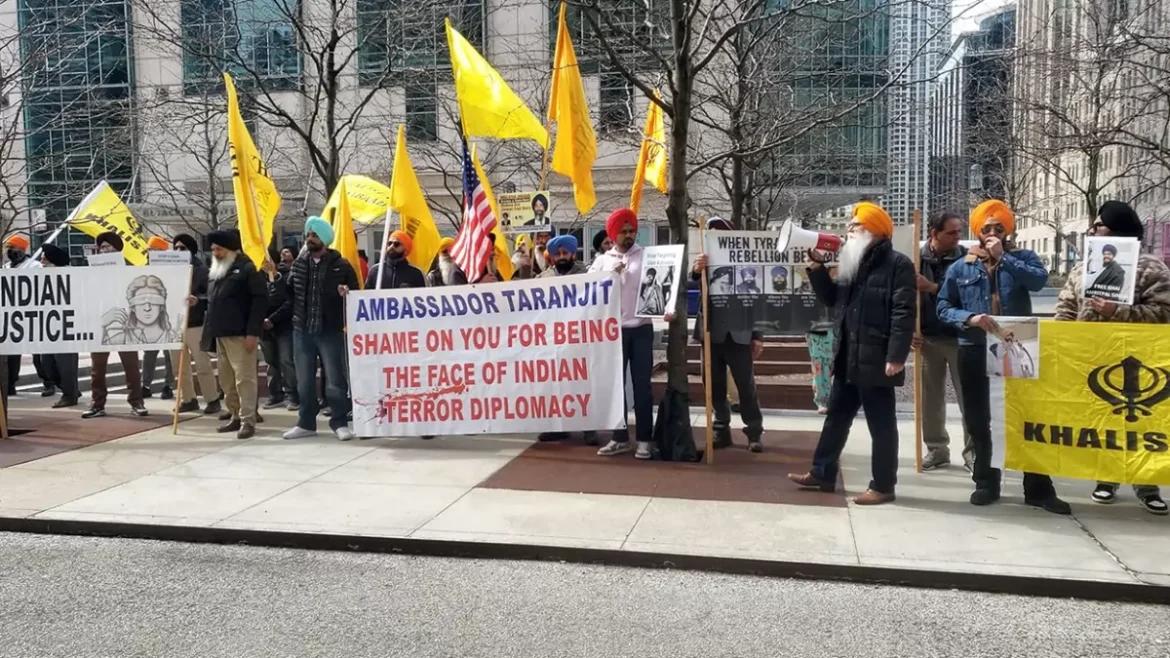AI Generated Summary
- This statement, more relevant than ever, serves as a call to the governments of Canada, the UK, the US and Australia to address the festering issue of Khalistan terrorism, an issue that is increasingly causing domestic disruption and jeopardizing diplomatic relations, notably with India.
- It is also important to emphasize that the path of violence and extremism being followed by Khalistan separatists is completely antithetical to the core principles of Sikhism.
- The video, bearing the ominous phrase “violence begets violence,” was purportedly posted by Khalistan supporters, making it clear that this was not a random act of vandalism, but a premeditated strike against a diplomatic mission.
In the wake of escalating violence perpetrated by Khalistan separatist elements in the West, the words of Hillary Rodham Clinton echo louder than ever: “You can’t keep snakes in your backyard and expect them only to bite your neighbors. You know, eventually, those snakes are going to turn on whoever has them in the backyard.”
This statement, more relevant than ever, serves as a call to the governments of Canada, the UK, the US and Australia to address the festering issue of Khalistan terrorism, an issue that is increasingly causing domestic disruption and jeopardizing diplomatic relations, notably with India.
India has long warned the world about the state-sponsored cross-border terrorism it continues to face, pointing towards elements in Pakistan and Khalistan networks in Western nations. While post 9/11, the West’s outlook towards radical terrorism changed, it continues to be complacent regarding the Khalistan terror network. This issue, once brushed aside, has escalated into open threats and violence against Indian diplomats and Indian diaspora. This cannot be tolerated.
On July 2, a disturbing video surfaced on Twitter, showing an act of arson against the Indian Consulate in San Francisco. The video, bearing the ominous phrase “violence begets violence,” was purportedly posted by Khalistan supporters, making it clear that this was not a random act of vandalism, but a premeditated strike against a diplomatic mission. This incident was seemingly a retaliation for the death of Hardeep Singh Nijjar, the Canada-based Khalistan Tiger Force (KTF) chief and one of India’s most-wanted terrorists, who was assassinated last month.
These acts of violence against a diplomatic mission constitute terrorism in its most raw form. They are not simple protests or expressions of dissent but calculated, destructive acts designed to create an atmosphere of fear and intimidation. The severity of these attacks is compounded by the target: diplomatic premises that are meant to be safe havens under international law, places where dialogue and diplomacy occur, not violence. This violation is not only an affront to the sovereignty of India but also a direct challenge to the principles of peaceful international relations.
It is also important to highlight that these extremist actions, if unchecked, could potentially lead to more catastrophic events like the 9/11 attacks or the Kanishka bombing. While these incidents differ in their nature and scale, they share a commonality in the perpetrators’ intent: to incite fear, spread chaos, and disrupt peace. Khalistan radicals seem to be traversing a similar path, using fear and violence as their primary tools to advance their separatist agenda.
The link between Khalistani separatist groups and Pakistan’s Inter-Services Intelligence (ISI) further exacerbates the situation. Despite their limited success in rallying support, these groups have nonetheless continued their attempts to destabilize relations between India and Western nations. The direct involvement of a foreign intelligence service in sponsoring and supporting these radical groups warrants further scrutiny and action from these countries.
Therefore, the consistent failures of these separatist groups should not be taken as a sign of their irrelevance. Their continued acts of violence, especially against diplomatic missions, underscore the urgency with which this matter should be addressed.
Responding to the recent arson attack, the US State Department, via spokesperson Matthew Miller, expressed its strong condemnation. However, it’s essential to shift from condemnation to prevention and robust action. It is high time the governments of Western countries take stringent steps to curb the growth and influence of Khalistan terror networks in their countries.
It is also important to emphasize that the path of violence and extremism being followed by Khalistan separatists is completely antithetical to the core principles of Sikhism. Sikhism places a strong emphasis on the values of love, peace, tolerance, and the well-being of all humanity. The teachings of the Sikh Gurus stress the importance of living an honest life, selfless service, and spiritual devotion. They espouse the concept of “Sarbat da Bhala,” which means welfare for all. This concept runs contrary to the divisive, harmful agenda of Khalistan extremists. Therefore, it is deeply saddening and disturbing to see a small but vocal faction twisting the faith’s teachings to justify their violent actions and spread discord.
Khalistan radicals may be a small group, but their actions are proving disproportionately disruptive. Their ideology, rooted in extremism and terrorism, poses a significant threat to global security and domestic law and order. The West must act now.
Let us remember that just as a single cancer cell is a threat to the whole body, extremism and terrorism, wherever they exist, pose a danger to the entire world. Ignoring the Khalistan issue will only exacerbate the situation, potentially allowing it to snowball into a crisis that may prove impossible to control.
It’s time for the West to reflect on Clinton’s cautionary advice. They must stop harbouring dangerous elements in their backyards, underestimating the risk they pose to their domestic communities and the world at large.
The need of the hour is for governments to intensify their efforts against Khalistani terrorism and extremism. Failure to do so will only reinforce the belief that some are willing to jeopardize international relations and global security for their short-term political benefits. The time to act is now, lest we allow another 9/11 or Kanishka bombing to unfold on our watch.




